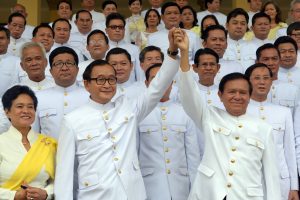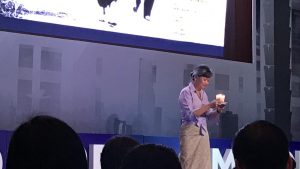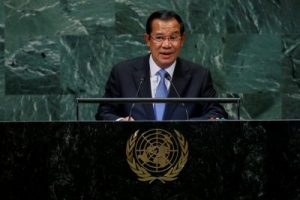Hun Sen illegitimacy
now browsing by tag
High-stakes wager underlines Cambodia’s dysfunction
Sam Rainsy claimed that such “international pressure” will force the CPP government to hold a swift trial for Kem Sokha in the coming months, after which Hun Sen will grant him a royal pardon. This would allow the CPP government to make headway in negotiations with the EU and US, forestalling further sanctions.
“No, I won’t release him,” Hun Sen responded hours after Sam Rainsy offered the wager over social media, adding that Kem Sokha would only be released when “the horse grows horns.”
លោកសម-រង្សុីអៈអាងថាគំនាបអន្តរជាតិនោះនឹងជំរុញអោយរដ្ឋាភិបាលគណបក្សប្រជាជនកម្ពុជាបើកការកាត់ក្តីភ្លាមៗសម្រាប់លោកកឹម-សុខាក្នុងខែខាងមុខ បន្ទាប់មកលោកហ៊ុន-សែននឹងស្នើសុំព្រះមហាក្សត្រដើម្បីលើកលែងទោស។ ធ្វើដូច្នេះអាចបើកផ្លូវអោយរដ្ឋាភិបាលគណបក្សប្រជាជនកម្ពុជាត្រួសត្រាយផ្លូវចរចារជាមួយអុីយូនិងសហរដ្ឋអាមេរិកដើម្បីទប់ស្កាត់ការគិតជាមុនក្នុងរឿងដាក់ទណ្ឌកម្មបន្ថែម។
ទេ ខ្ញុំនឹងមិនដោះលែងគាត់ដាច់ខាត – លោកហ៊ុន-សែនឆ្លើយតបមិនប៉ុន្មានម៉ោងក្រោយលោកសម-រង្សុីបបួលការភ្នាល់តាមបណ្តាញសង្គម ដោយលោកហ៊ុន-សែនបន្ថែមថាដោះលែងលុះត្រាតែសេះដុះស្នែង។
The connections between the CPP and senior judiciary officials is obvious. Dith Munty, the Supreme Court’s president who presided over the CNRP’s dissolution case, is a member of the CPP’s elite Permanent Committee, its main decision-making body.
Chiv Keng and Chea Leang, members of the Supreme Court’s jurist council, sit on the party’s more voluminous Central Committee, as does Yun Bunleng, president of the country’s Appeals Court.
ទំនាក់ទំនងរវាងគណបក្សប្រជាជនកម្ពុជានិងមន្ត្រីតុលាការជាន់ខ្ពស់គឺពិតជាក់ស្តែង។ លោកឌិត-មន្ទី ជាប្រធានតុលាការកំពូលដែលដឹកនាំករណីរំលាយគណបក្សសង្គ្រោះជាតិគឺជាសមាជិកគណកម្មាធិការអចិន្ត្រៃយ៌សំខាន់របស់គណបក្សប្រជាជនកម្ពុជា ជាអង្គភាពខាងផ្តល់ការសម្រេចចិត្តសំខាន់របស់ខ្លួន។
លោកជីវ-កេងនិងអ្នកស្រីជា-លៀង ជាសមាជិកក្រុមប្រឹក្សានៃអង្គចៅក្រមនៃតុលាការកំពូល អង្គុយជាគណៈកម្មាធិការកណ្តាលជាមួយសមាជិកដ៏ច្រើនផ្សេងទៀតរបស់គណបក្សកាន់អំណាចនេះ រួមទាំងលោកយូ-ប៊ុនលេងផងដែរដែលជាប្រធានតុលាការឧទររបស់ប្រទេស។
Op-Ed: Asia Time
High-stakes wager underlines Cambodia’s dysfunction
PM Hun Sen takes a bet with exiled opposition rival Sam Rainsy that could force him to choose between continued political domination and economic survival

The intention of Sam Rainsy, the former CNRP president who has been in exile since late 2015, appears to be to force Hun Sen to choose between his own domination of politics and the country’s economic survival. Kem Sokha’s liberty, however, could come at the cost of both.
With the CNRP off the ballot, the CPP easily won July’s general election, securing all 125 seats in the National Assembly. The international community, meanwhile, described the election as illegitimate and are lining up retaliatory sanctions for the move away from democracy.
After a year of political deterioration, the CPP government is under intense pressure from the international community and could soon be removed from a preferential-trade scheme by the European Union, its largest export market.
The United States, which has imposed financial sanctions on some Cambodian officials, has along with the EU made the dropping of charges against Kem Sokha one of its chief diplomatic demands.
Sam Rainsy claimed that such “international pressure” will force the CPP government to hold a swift trial for Kem Sokha in the coming months, after which Hun Sen will grant him a royal pardon. This would allow the CPP government to make headway in negotiations with the EU and US, forestalling further sanctions.
“No, I won’t release him,” Hun Sen responded hours after Sam Rainsy offered the wager over social media, adding that Kem Sokha would only be released when “the horse grows horns.”

Fresh News, a CPP-aligned media outlet, quoted Hun Sen as saying that he agreed to Sam Rainsy’s wager. “I bet with Sam Rainsy. If Kem Sokha is released, Hun Sen will resign; but if not, Rainsy shall dare to be arrested,” he reportedly said.
Sam Rainsy later claimed that he had tricked Hun Sen – “who has fallen into my trap”, he said – by explicitly showing himself to be a “dictator who is using the court as a political tool.”
For months, government spokespeople have said that Kem Sokha’s detention is a matter for the judiciary and neither Hun Sen nor government ministers have any say in the matter. Hun Sen’s public comments, however, appear to be an admission he controls the judiciary, analysts said.
“This says that even Hun Sen finds Cambodia’s judicial system farcical,” said Paul Chambers, a political analyst at the College of Asean Community Studies at Naresuan University in Thailand. “Hun Sen is happy to let everyone clearly understand that only he controls the levers of power and jurisprudence in the country.”
Sam Rainsy, who spoke to Asia Times over the weekend, defended the wager. “This is a unique opportunity to make things move forward and to break the deadlock,” he said.
“I accept to possibly lose my freedom in order to ensure freedom for the Cambodian people. But Hun Sen’s falling into my trap has made his position untenable.”
The wager, however, could be a lose-lose for both. By publicly accepting the wager with the proviso that he will step down, there will undoubtedly be criticism of Hun Sen if Kem Sokha is released and he remains as prime minister.
The EU said in October that the process to remove Cambodia from its Everything But Arms (EBA) scheme could begin by early next year.

If enforced, analysts predict the implosion of Cambodia’s export- driven economy, especially its garment sector, currrently the largest contributor to gross domestic product. The country’s garments are chiefly sold to European markets.
The EU demands that charges be dropped against Kem Sokha, one condition that could save Cambodia’s place in the EBA scheme.
But if Hun Sen sticks to the wager, then Kem Sokha will either have to be imprisoned and not pardoned – his charge carries a possible 15 year sentence – or held in pre-trial detention until March 3, which would be in violation of Cambodian law.
“It does appear that someone took the bait and ended-up making a farce of judicial independence and the rule of law,” said Sophal Ear, associate professor of diplomacy and world affairs at Occidental College at Los Angeles “Surely [Hun Sen] should have seen it coming – as a chess player and master of strategy.”
Somewhat ironically, the wager was made during the visit of Rhona Smith, UN Human Rights Council’s Special Rapporteur on Human Rights in Cambodia. She spoke chiefly about the need for judicial reform during her two weeks in Phnom Penh. (The government denied her a meeting with Kem Sokha.)
The connections between the CPP and senior judiciary officials is obvious. Dith Munty, the Supreme Court’s president who presided over the CNRP’s dissolution case, is a member of the CPP’s elite Permanent Committee, its main decision-making body.
Chiv Keng and Chea Leang, members of the Supreme Court’s jurist council, sit on the party’s more voluminous Central Committee, as does Yun Bunleng, president of the country’s Appeals Court.

“Cambodia’s courts are not independent. If anything is remotely political, they take their marching orders from the executive branch [of the CPP]. It’s not the rule of law; it’s the rule of man, and one man in particular,” said Sophal Ear. “Judicial independence is still a dream in Cambodia.”
Human rights campaigners, journalists and political commentators were arrested in the months leading up to the election, but some had their convictions quashed post-election under royal pardons, which were requested by Hun Sen.
Indeed, Hun Sen’s new one-party state has been swiftly loosening some of the restrictions it enacted before July’s general election. However, Hun Sen and other senior CPP officials say there is zero possibility of the CNRP being reinstated as a political entity.
Sam Rainsy, meanwhile, also finds himself in a tricky position. For a start, he has now publicly stated that will return to Cambodia to face imprisonment if Kem Sokha isn’t released by March.
Some CNRP members have spoken privately of their displeasure at Sam Rainsy fleeing the country in 2015, rather than staying to resist. If he fails to stick to the wager’s terms, it could further tarnish his reputation for integrity.
Added to this, some within the Party thought Kem Sokha would be more likely released if tensions between the CPP and CNRP eased. But by pouring more gas onto the fire, Sam Rainsy might have scuppered any such accommodation.

Cambodian opposition leader Sam Rainsy (C-L) raises hands with Kem Sokha (C-R), deputy of Cambodia National Rescue Party (CNRP) in front of members of parliament before the swearing in ceremony inside the Royal Palace in Phnom Penh on August 5, 2014. Rainsy and 54 other members of his party were sworn in as members of parliament on August 5, after a year-long boycott of parliament triggered by a disputed election. AFP PHOTO/ TANG CHHIN SOTHY / AFP PHOTO / TANG CHHIN SOTHY
Hun Sen, a stubborn leader who has been premier since 1985, might have been willing to release Kem Sokha because of international pressure, analysts say, but he would not be willing to lose even more face by backing down to Sam Rainsy’s gamble, too.
“Because of the bet, Kem Sokha is sure not to be released by March 3,” said Sophal Ear.
It has also re-opened rifts between the two main factions of the CNRP, which was formed in 2012 by the merger of Sam Rainsy’s eponymous party and Kem Sokha’s Human Rights Party.
In 2016, tensions between the two leaders’ groups spilled out into the open, when one senior party official threatened to quit unless underlying issues were resolved.
After the CNRP’s dissolution, Sam Rainsy and some party members who came from his original party formed in America the Cambodia National Rescue Movement (CNRM). At the time, Kem Sokha loyalists claimed this was Sam Rainsy’s attempt to re-assert his control over the opposition movement.
Kem Sokha took over as CNRP president in early 2017 after Sam Rainsy was forced to resign due to legal changes in Cambodia that would have dissolved the party if he remained as leader.
“Kem Sokha and Sam Rainsy have been political allies in the CNRP only when it suits them. In this case, Rainsy seems to be trying to promote himself as the leading personality opposing Hun Sen, even if the bet is detrimental to Kem Sokha,” said Chambers. “But ultimately if because of the bet the CNRP’s two leading factions grow further apart, it only helps Hun Sen.”














